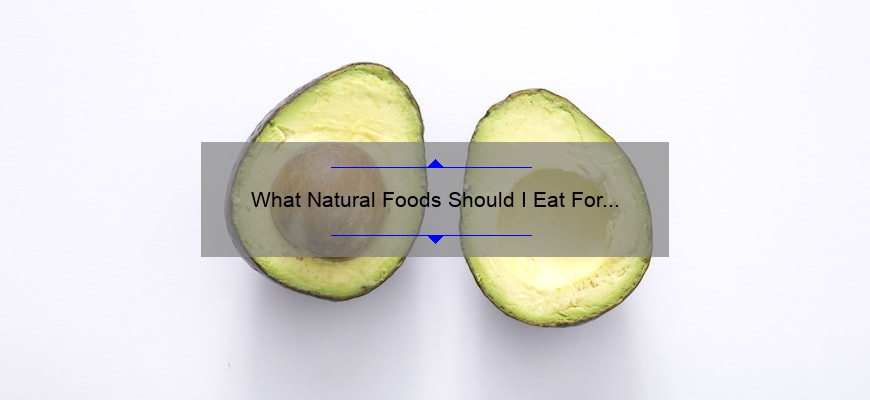Introduction
Did you know your brain health can benefit from what’s on your dinner plate? Imagine fueling your brain with foods so powerful that your cognitive function, memory, and mood get a noticeable boost. As our understanding of nutrition deepens, the adage “you are what you eat” extends beyond body health to the pinnacle of our physical existence – our brain. This compelling article uncovers the edible treasures that promise a sharper mind and a resilient brain.
Diving into the core of mental fitness, the piece weaves through a pantry of brain-boosting delicacies. From the ocean’s omega-rich depths to the forest’s antioxidant-laden nooks, we explore the natural foods that should take center stage in any brain-healthy diet. Presented by a trusted source in health compliance, the author brings not just delectable food for thought but a tangible menu for mental clarity.
What unfolds is a meticulously curated list, each item backed by scientific insight, ready to reveal the secrets that link what we eat to how we think. Get ready to whisk through omega-3s powerhouse fish, unravel the mysteries of flax, crack open the cognitive prowess of walnuts, and leaf through veggies that pack a punch against cognitive decline.
This is not just about eating smart; it’s about giving your brain the care and nourishment it deserves. Let your curiosity drive you through this exploration as we shift from the ‘why’ to the ‘what’ in the quest for a thriving brain. Just as a sumptuous meal begins with a single bite, your journey toward brain health starts with a single read. So, indulge your appetite for knowledge and prepare to turn the page—your brain will thank you.
Fish for Brain Heath
Eating fish regularly can help improve your brain’s memory and function. Many fish are high in omega-3 fatty acids, essential for the brain, and DHA is especially beneficial, as it’s a form of omega-3 that brain tissues prefer. Other benefits of eating fish include improved mood and reduced stress. Studies also show regular fish consumption can lower your risk of cognitive disorders like Alzheimer’s.
Another natural food for brain health is flax. Flax is a seed rich in a plant-based omega-3 fatty acid called Alpha-linolenic acid. This substance helps build the membranes of brain cells and fights inflammation. It also benefits your digestive system and can help reduce your blood cholesterol.
Walnuts are another great source of omega-3 fatty acids and are high in vitamin E. They improve brain health by strengthening brain cells and improving cognitive function. Walnuts contain DHA, an Omega-3 fatty acid that enhances mental performance and protects against age-related cognitive decline. Vitamin E intake has also been linked to improved cognitive function.
Dark leafy greens are another food that can improve your brain’s function. They contain a powerful antioxidant called vitamin E that protects brain cells from free radicals, which damage DNA. Those who eat leafy greens regularly have better memory and cognitive functioning than those who do not regularly eat this food. They are versatile and can be eaten raw or cooked with spices, including turmeric and black pepper.
Leafy Greens for Brain Health
Researchers studied the relationship between leafy green consumption and brain health. They found that eating more leafy greens decreased the rate of decline in memory and thinking tests. The results showed a significant difference between those who consumed the most petite leafy greens and those who consumed the most leafy greens, and the difference between the two groups was equivalent to being 11 years younger. Moreover, the study’s results held even after controlling for other factors.
Leafy greens are packed with bioactive compounds and nutrients that protect the brain from damage. They contain folate, vitamin E, and lutein, which are essential for brain health and can prevent memory loss, cognitive decline, and oxidative damage.
Leafy greens are a great source of nutrients and vitamins, and they can be eaten in various forms, including raw or cooked. The recommended amount of leafy greens per day is one cup, and spinach is one type of lush green that can be consumed raw or cooked.
Leafy greens also support the immune system. Studies have shown that cruciferous vegetables activate the T-bet gene in the intestinal lining, instructing precursor cells to produce innate lymphoid cells. These cells help the body fight off toxins and infections. In addition, they help maintain a healthy balance between the good and bad bacteria in the microbiome.
Nuts for Brain Health
Nuts are an excellent source of phytochemicals, vitamins, and minerals that can support brain health. They are rich in omega-3 fatty acids, which protect against degenerative diseases. Some research has also linked nuts to better cognition. For example, a review of studies published in 2017 found that walnuts are associated with improved cognitive function.
Nuts can also help protect against oxidative stress. They are packed with vitamin E, which protects the body against oxidative damage. The anti-inflammatory properties of walnuts can help the brain deal with the stress and anxiety caused by stressful situations. Walnuts also contain high levels of n-3 a-linolenic acid, which reduces inflammation.
Nuts are also rich in antioxidants, which can help the brain stay healthy and function properly. Studies have shown that eating nuts regularly can improve memory. They also contain plant-based protein, unsaturated fats, and fiber. Moreover, they contain bioactive compounds that act as antioxidants, which can help prevent cell damage and slow the aging process. Some studies have even linked eating nuts with improved cognitive function in older adults.
Researchers have found a strong association between nut consumption and reduced risk of depression in adults. These studies found that eating nuts significantly reduced the risk of depression and improved mood states. These results are consistent with earlier studies.
Avocados for Brain Health
Avocados contain many monounsaturated fats, which are good for our hearts and brains. They are also high in oleic acid, which is linked to memory strength and brain function. You can add avocados to your diet by adding them to salads and soups. You can also have them in desserts, including guacamole. It’s important to note that avocados are high in calories. Adding one avocado daily to your diet can have tremendous benefits.
Avocados’ high level of monounsaturated fatty acids protects the brain’s nerve cells called astrocytes, which support information-carrying nerves. Studies have shown high-quality avocados improve brain control in animals with damaged astrocytes. In addition, avocados reduce high blood pressure and the risk of dementia.
Avocados are a good source of lutein, a carotenoid antioxidant commonly found in many fruits and vegetables. It has a role in eye health and is increasingly recognized as beneficial for brain health. A single avocado provides the equivalent of 408 ugs of the carotenoid lutein. A few studies have linked lutein levels to cognition, but they are limited.
Avocados contain monounsaturated fat, which helps lower blood pressure and improve blood flow. In addition, avocados contain omega-3 fatty acids, which can prevent the development of Alzheimer’s disease.
Seaweed for Brain Health
Seaweed is a natural food that contains many of the nutrients essential for healthy brain function. In addition to its high nutritional value, seaweed is high in polyunsaturated fatty acids and has numerous other benefits. For example, it contains iodine, which is necessary for brain development, and iron and zinc, which can help improve brain function.
Studies have shown that seaweed may protect the brain from neurodegenerative diseases. It has cholinesterase inhibitory activity, which inhibits the degeneration of neurons. In animal models, seaweed inhibits the activation of microglia, which are involved in destroying neurons. Studies show that too much microglia activity is associated with the development of neurodegenerative diseases. Therefore, regulating microglia release may be a therapeutic strategy for brain health.
Seaweed also contains significant amounts of iodine. Iodine is essential for brain development, and two tablespoons of wakame seaweed contain approximately 280% of your recommended daily iodine intake. It also contains magnesium, which protects the brain from the damaging effects of stress.
Research has shown that seaweed contains omega-3 fatty acids, which can improve memory and mental performance. Many populations depend on seaweed as natural food to nourish their children’s brains. In addition, seaweed is gluten-free, high in fiber, and low in carbohydrates. Its anti-inflammatory properties may also help your skin.
Fruits for Brain Health
Dried figs are an extremely healthy snack for your brain and an excellent magnesium source. The average fig contains around 68mg of magnesium per 100g. Dried figs are also high in potassium and fiber, improving heart health and essential for brain health. Another excellent choice for brain health is raisins, small, dark fruits packed with nutrients.
Strawberries are high in antioxidants and an excellent source of vitamin C. They also contain manganese, vitamin B9, and a moderate amount of potassium. Strawberries are one of the most common berries and have similar brain-boosting properties to blueberries. These berries can help keep your mind sharp even as you get older, and some research shows that strawberries may help prevent memory loss.
Fruits and vegetables rich in omega-3 fatty acids are other excellent choices for improving brain health. These foods also improve memory and concentration. You should also include nuts and seeds in your diet. They are high in vitamin E and omega-3 fatty acids, which are great for the brain, and low levels of vitamin E have been linked to reduced cognitive function.
Research shows that berries, especially red ones, contain potent antioxidants that can slow the progression of Alzheimer’s disease. Berries also contain anthocyanin, which is associated with a lower risk of Alzheimer’s disease. Moreover, blueberries contain phytochemicals that help protect against the damaging effects of reactive oxygen species in the brain.
Conclusion
Throughout this article, we have uncovered the profound link between our daily diet and brain health. From the Omega-3-rich depths of our oceans with fish and seaweed to the antioxidant-packed fields of leafy greens, nuts, and berries, it is undeniable that nature provides a diverse buffet of ingredients essential for cognitive enhancement, memory boost, and overall brain health.
Equally important is the revelation that these brain-boosting foods aren’t isolated in their benefits but yield abundant nutritional profiles that support other aspects of physical health—thereby advocating for a holistic approach to wellness. Simple and mindful dietary tweaks can help fortify and protect our most vital organ, our brain.
As we conclude, let us remember the interconnected nature of our body systems and nutrition’s essential role in promoting overall health. Our brains depend on us to make intelligent choices. By selecting foods rich in omega-3 fats, antioxidants, and essential vitamins, we are enhancing our cognition and memory and nurturing our overall well-being. As the saying goes, ‘We are indeed what we eat.’ It’s time to make every forkful count for the benefit of our brilliant brains.



